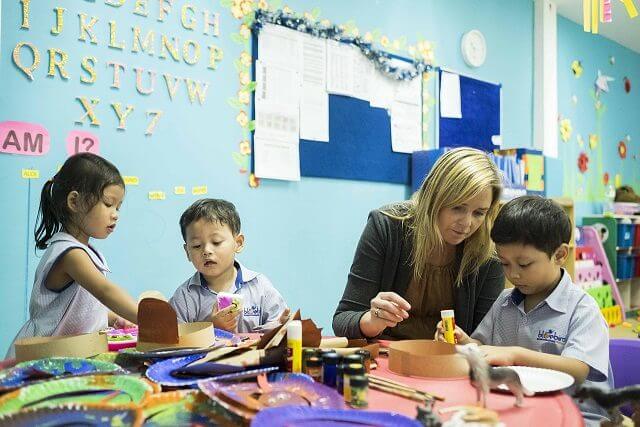Is My Preschooler Prepared for Primary One? – A Comprehensive Guideline
Published on 26 January 2018 by Edu Aid | For Parents

Is my preschooler prepared for Primary 1? This was almost never a concern of most parents 20 years ago. 20 years ago, majority of Primary 1 students would enter school with near zero ability to read and write English. Primary 1 syllabus was very much foundation building – starting from the basics.
However, today’s Primary 1 syllabus has changed remarkably. Our children are already taught phonics and spelling in Kindergarten. By the time they get to Primary 1, they are expected to read and write clearly. Talk to any parent of Primary 1 students today and you will hear many complaining about their kids not catching up, or receiving so much negative feedback from teachers it gets downright demoralizing.
Are our children really prepared for Primary 1? This is not a question asked out of a “kiasu” attitude. This is a very legitimate concern today. So here we have it for you – 5 aspects we can prepare our preschoolers for Primary 1.
Handwriting
The importance of handwriting at Primary 1 cannot be undermined. Honestly, it really depends on your child’s teacher. However, most teachers get frustrated with bad handwriting. Many will mark your child’s answer wrong even if we can tell that his intention is correct and it’s merely his handwriting that is illegible.
Schools used to make students practice through repetitive writing. Unfortunately, many of today’s schools have removed this form of homework. Students are not made to practice their handwriting but would potentially get penalized if they do not write clearly.
Without a doubt, the responsibility now lies on the parents to make sure their child writes clearly in school. Now, this is not something you want to catch up with only when your child reaches Primary 1, along with every other learning to do, like memorizing of the multiplication table, han yu pin yin and more complex phonics. Therefore, it is important to pay attention to your child’s handwriting before he gets to Primary 1, as early as K1.
Practice makes perfect. We cannot expect nice handwritings out of our children if they don’t use their fingers to hold a pencil more than they use their fingers to swipe a tablet.
Reading & Understanding Instructions
A child, ideally, should be able to read by the time he reaches K2. He must be able to read and understand instructions in English by the time he enters Primary 1.
Mother Tongue makes 1 subject but English makes 2 in Primary 1 – English and Math. If your child cannot read by Primary 1, he is not only going to struggle with English but with Math too. He may be strong in Math, but because he is unable to read he will end up with falling grades in a subject he is supposed to score in. This is definitely a very demoralizing start for primary school.
Emotional Quotient
What exactly is Emotional Quotient? It is “the capability of individuals to recognize their own emotions and those of others, discern between different feelings and label them appropriately, use emotional information to guide thinking and behavior, and manage and/or adjust emotions to adapt to environments or achieve one’s goal(s)” – Quotes Wikipedia.
Getting to primary school means your child is growing up, and learning to interact with the world. Your child will be exposed to new teachers and new classmates. In fact, he will have more classmates than before in Kindergarten. If he has been home-schooled in Kindergarten, the learning curve for socializing behavior is even steeper. Your child will start to make friends, ideally. Every parent wishes for his child to grow up emotionally and socially healthy.
Therefore, we should help our children grow in their emotional quotient as preschoolers. Some of the ways to do it can be: more interactions with extended family members like cousins, grandparents, aunties and uncles; attending a social group with the child, eg. A religious gathering or even residential committee events. We can also organize play dates for our children, so that they learn to interact with other children better.
Basically, getting our children to interact with other people more, and having them watch us model the way in our interactions with others can help them grow in their emotional quotient.
Established Good Habits
The jump from Kindergarten routine to Primary School routine can be taxing to a child, considering the time spent in school as well as after school homework load. Expectations from teachers can take a toll on the child as well, depending on the school he is in.
To make sure your child continues to thrive in this new milestone, it is important that some good habits be already established before he enters Primary 1. Some of these good habits are: sleeping early, homework before play, eating properly on his own, good money management, tidying up on his own.
It is definitely not too early for a preschooler to be money-wise, since he is going to be spending money on his own during recess time in Primary 1. In fact, it is a good idea to expose your preschooler to the use of money on his own, under your supervision. For example, you may pass him a $2 note and have him walk around the Supermarket with you, and select what he likes to buy with the money.
It can be more difficult for some kids to keep tidy. This problem in a child can manifest in Primary 1, when we look at a child’s bag or state of homework. A child that is not organized will nearly always be late in his submission of homework, and that definitely does not reflect well on him. If you are struggling with a child who can never seem to get organized, this book may help: That Crumpled Paper Was Due Last Week: Helping Disorganized and Distracted Boys Succeed in School and Life
Conclusion
The content of this article can seem daunting to a parent of a preschooler. As you read this article as a parent of a preschooler, you may have many questions running through your mind. How is my child ever going to catch up? Am I already falling behind? Should I search for Primary 1 Preparatory classes for my child to attend?
The purpose of this article is not to discourage any parent, or to scare anyone to a knee-jerk reaction and send his child to more enrichment classes. It is basically a very comprehensive guide, as the title of the article suggests. It helps us to be more conscious of what we need to do to help our children set stronger foundations. Of course, there will be children who may have learning difficulties and will be unable to catch up academically. At least, the parent is prepared and will adjust his expectations on the child’s performance in school accordingly. This article only aims to reduce the frustration any parent will experience when a child gets to Primary School. All the best, parents!
Useful Link: Engage a Preschool Tutor for your child





